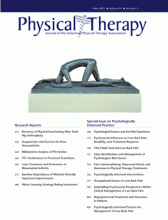Abstract
Background A goal of physical therapy interventions for children and youth with acquired brain injury (ABI) is the learning and relearning of motor skills. Therapists can apply theoretically derived and evidence-based motor learning strategies (MLSs) to structure the presentation of a task and organize the environment in ways that may promote effective, transfer-oriented practice. However, little is known about how MLSs are used in physical therapy interventions for children with ABI.
Objective The purpose of this study was to develop and validate an observer-rated Motor Learning Strategy Rating Instrument (MLSRI) quantifying the application of MLSs in physical therapy interventions for children with ABI.
Design A multi-stage, iterative, item generation and reduction approach was used.
Methods An initial list of MLS items was generated through literature review. Seven experts participated in face validation to confirm item comprehensiveness. In a content validation process, 12 physical therapists with pediatric ABI experience responded to a questionnaire evaluating feasibility and importance of items. Six physical therapy sessions with clients with ABI were videotaped at a children's rehabilitation center. The 12 physical therapists participated in a session where they: (1) rated session videos to test the MLSRI and (2) provided verbal feedback.
Results Revisions were made sequentially to the MLSRI based on these processes.
Limitations The MLSRI was scored during videotape observation rather than being given a live rating, which may be onerous in certain settings and may influence therapist or child behavior.
Conclusions Further reliability investigations will determine whether the 33-item MLSRI is of help in documenting strategy use during intervention, as an evaluation tool in research, and as a knowledge transfer resource in clinical practice.
Footnotes
All authors provided concept/idea/research design. Ms Levac, Dr Missiuna, Ms DeMatteo, and Dr Wright provided writing. Ms Levac and Dr Wright provided data collection. Dr Wright provided data analysis and facilities/equipment. Ms Levac, Ms DeMatteo, and Dr Wright provided project management. Dr Missiuna, Dr Wishart, Ms DeMatteo, and Dr Wright provided consultation (including review of manuscript before submission). The authors acknowledge the assistance of Dr Tim Lee, Vince DePaul, Jackie Bosch, Lisa Rivard, and Dayle McCauley in developing Figure 1.
Ethical approval for the study was received from the research ethics boards of Holland Bloorview Kids Rehabilitation Hospital and McMaster University.
Ms Levac is supported by a doctoral award from the Canadian Child Health Clinician Scientist Program (CCHCSP), a strategic training initiative of the Canadian Institutes of Health Research (CIHR), and the McMaster Child Health Research Institute. Dr Missiuna holds a Rehabilitation Scientist Award from the Ontario Ministry of Health and Long Term Care and the Ontario Neurotrauma Foundation.
- Received December 6, 2010.
- Accepted January 23, 2011.












